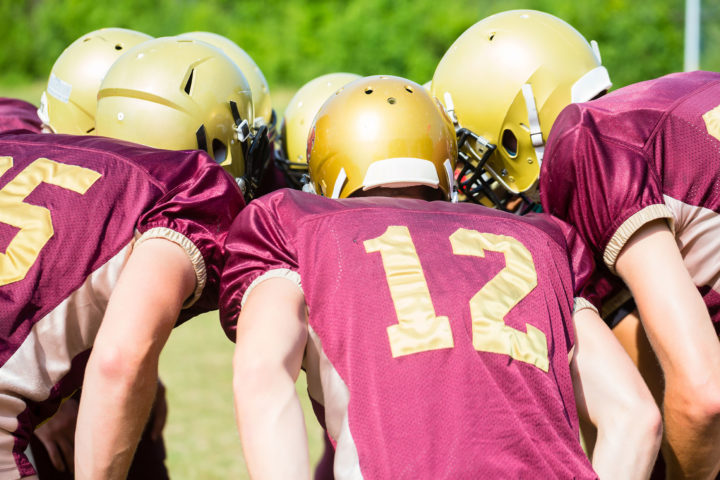Fruita Monument High School coaches want their players to think about the kind of people they want to be, and to apply weekly “man builder” lessons both on and off the field.


Fruita Monument High School coaches want their players to think about the kind of people they want to be, and to apply weekly “man builder” lessons both on and off the field.
“It’s the real part of coaching,” assistant coach Cameron Ross told The Daily Sentinel. “Football is great and it’s important, but it’s a small piece in the scheme of things. It’s through football that we get to teach them these life skills, these things off the field, and those will be with them the rest of their lives.”
Fruita coaches infuse the weekly character education lessons into the team’s routine, helping students to view the sport as a microcosm for life. The lessons, coaches said, are designed to focus students on the true purpose of athletics in schools, and to set students up with a strong moral foundation that will serve them well beyond graduation.
Amid a national controversy involving NFL players taking a knee or refusing to stand for the national anthem, the Fruita Monument Wildcats recently streamed into the school’s stadium for a game against Denver South High School with American flags in hand.
The experience was accompanied by a “man builder” discussion with Grand Junction Police Sgt. Lonnie Chavez, a member of the department’s honor guard, about the symbolism of the flag, proper handling etiquette, and parallels between his work as an officer and students’ roles on the football team.
“I want to impart that the choices they are making now will affect them later in life,” Chavez told the news site. “When they’re presented with that one marijuana joint, that one drink, taking pills, asking a girl to send nudes, things like that; those are things that society says are acceptable now, and I want them to know that there’s a little bit of respect left there and that respect is something you need to bring on board with you in life.
“If you take that respect and make an honorable choice,” Chavez said, “it really pays off later in life.”
The sergeant said his childhood in a military family showed him why it’s important to respect veterans, and his time as a police officer offered further insight into the symbolism of the American flag. But the lessons, including the recent talk about the flag, have more to do with respect than politics.
“As a member of the honor guard, it’s important to know what it is that you’re carrying,” he said. “Do you know what you’re carrying? I’m not talking about taking a knee, raising a fist or anything like that. All things being equal, if you understand why you’re kneeling, I have a ton of respect for you. If you understand what you’re carrying, what you’re standing for, I have the same, equal amount of respect for you.”
Chavez’s recent talk is among a wide range of subjects covered during the season. Some of the discussions are led by coaches, others by guest speakers like Chavez. Students take notes during the “man builder” sessions to reflect on what they’ve learned, and several said they’re better for it.
Lineman Daniel Haas said the lessons have helped him “grow off the field,” according to The Daily Sentinel, while kicker/receiver Marcus Mosnes said players have “become better men” thanks to their coaches.
“You learn from (the coaches) and other experiences,” Mosnes said. “We just learn to be better people. Sure, there are going to be challenges in life and stuff, but there are always ways to face it.”
The efforts in Fruita are also the types of intentional character education lessons students rely on to shape not only their worldviews, but also the moral fabric of their lives.
James Davison Hunter, sociologist at the University of Virginia, explained why that’s important in his most recent book The Tragedy of Moral Education in America:
So we are not born with moral understanding, a worldview that gives coherence to life, or ideals to guide our lives. These are what culture provides us, through the overlapping communities into which we are socialized. First among these communities, of course, is the family, for it is as very small children in the context of our families that we begin learning what is right and wrong, and why.
But families generally don’t live in isolation; rather, they are part of a larger network of social groups and institutions that typically include faith communities, schools, volunteer associations, and the like, which together form a moral ecosystem or moral culture.
The nonprofit Positive Coaching Alliance recognizes the role of coaches as part of the larger social network that strongly influences students’ character, and advocates for the kind of “double-goal coaching” making a difference in Fruita.
In The Power of Double-Goal Coaching, Alliance founder Jim Thompson explains why coaches should embrace their roles to “transform the culture of youth sports to make it a positive, character-building experience for every youth athlete” and lays out practical tools they can use to help students in a variety of athletics.
Backed by a national advisory board that features Olympic Gold Medalists Brandi Chastain and Summer Sanders, as well as 11-time NBA Championship coach Phil Jackson and others, the Alliance also offers live workshops, online courses, and other programs specifically for parents, coaches, athletes and school leaders.
For further reading on CultureFeed